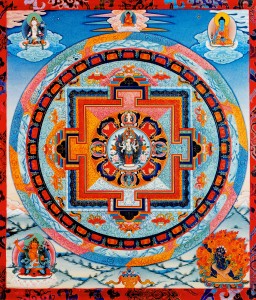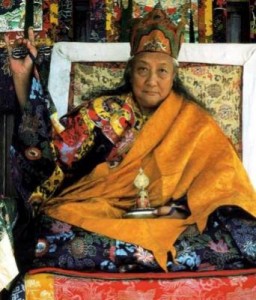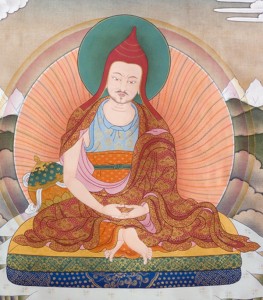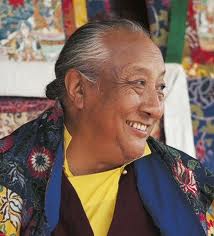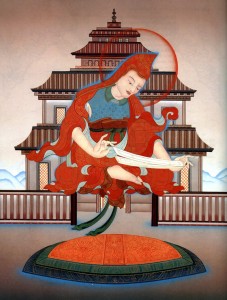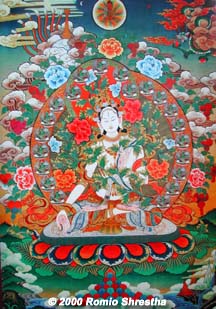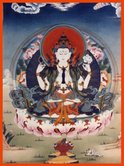The following is an excerpt from a teaching by Jetsunma Ahkon Lhamo called “The Bodhisattva Ideal”
The posture of a Bodhisattva is misunderstood in our culture. When a parent raises a child, the parent does not say to the child, “What I’d really like you to do, darling, is to be a great, generous mystic. I want you to be so generous that you give your life up for others. I want you to be so generous that you pay no attention to your own welfare or comfort, but instead I would like you to live and die for the benefit of sentient beings.” Nobody’s mother told them that! Due to the culture that we are raised in, we are told by our parents, their parents before them, and everything around us that there are certain things that one must do in order to be successful. One must gain recognition, power, money, ease of living. These are the things that one must do. But when one enters onto the path and becomes a Bodhisattva, one is faced with an entirely new set of ethics and morals and responsibilities.
This entire process must be understood as an intelligent, logical and reasonable process, simply by virtue of the fact that no matter what we accomplish during the course of this lifetime, other than the impact it has on our own bouquet of habitual tendencies, there is not one piece of what we collect that we can take with us, not one thing. So here is the Bodhisattva’s intelligence. And it is an intelligence. It is based on truth. It is based on fact. It is something like the intelligence of a person who receives a great deal of money, let’s say, or something precious and, if they’ve never had that before, if they haven’t thought it through, they might say, “Oh now I’ve got, let’s see, I’ve got $10,000 here so I’m going to go out and I’m going to spend that money and have a really good time. I’ve never had $10,000 before, so I’m just going to go spend it, and I’m going to get all the things that I wanted to get. Get some of my bills paid up, and I’m going to get a, let’s see, a down payment on a car, and I’ve got some clothes that I have in mind and all these different things. Maybe I’m going to buy a new TV. I’ve got all this laid out.” A sentient being’s normal reaction to having blessings in their life, or to life itself, is a little bit like that. I’ve got this thing. How am I going to spend it?
The Bodhisattva thinks very differently. The Bodhisattva realizes that, according to the Buddha’s teaching, life is like a precious jewel. When one meets with Dharma, meets with the teacher, and meets with the method by which we can accomplish realization, this life is understood as wealth for sure. We understand that there is a tremendous gift here. But how is the gift utilized? There comes in a completely different kind of logic.
The Bodhisattva realizes that, in the end, all will come to nothing. If our only gain is on the material realm, in the end all of the effort that we put into self-cherishing and beautifying ourselves, and the ease and comfort of our lives, and the accomplishments on the mental and physical levels of our lives, even those greatly cherished social institutions like vast education, even that will come to nothing, other than perhaps the discipline of studying. That habit may be brought into the next rebirth. .But everything that we have learned to love and cherish will come to nothing.
And so the Bodhisattva thinks, therefore, if in samsara, all efforts come to nothing, if all that survives is one’s virtue or lack of virtue, if all that matters in samsara eventually breaks down, then why should I put much effort into these things? Why should these things be precious to me? Because ultimately they will be lost, they will come to nothing.
The Bodhisattva then thinks more like a smart investor. You want to invest in that which brings ultimate returns: kindness, generosity, spiritual habits, habits associated towards travelling on the path of Dharma and developing oneself spiritually. Making offerings, living with generosity, meditating, praying, contemplating, teaching—these virtuous acts are the things that will bring a result that one can carry over into the next life. So the Bodhisattva is not so much a martyr as someone who has been trained through logic and reason to understand not to put all of one’s emphasis and hope in that which will ultimately disappoint. The Bodhisattva has been trained well enough to know that ultimately all things in samsara are disappointing. And so the Bodhisattva then makes the choice, based on training, to put one’s emphasis and one’s effort only in those things which will produce the excellent result of enlightenment and benefit to others. This is how the Bodhisattva thinks.
Copyright © Jetsunma Ahkon Lhamo. All rights reserved

